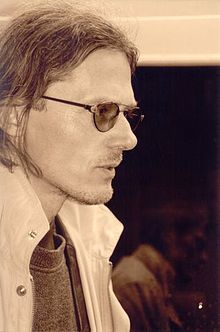Eugenijus Ališanka

Eugenijus Ališanka (born February 22, 1960 in Barnaul , Soviet Union ) is a Lithuanian poet, translator and essayist. Since 2003 he has been editor-in-chief and publisher of the Vilnius Review , a magazine that publishes contemporary Lithuanian literature in English translation. Ališanka is considered to be one of the most important contemporary poets in his country.
life and work
Eugenijus Ališanka was born in Siberia , where his parents were exiled. In 1962 they were allowed to return to Lithuania and Ališanka grew up in Vilnius . He studied mathematics at Vilnius University and then worked as a research assistant at the Institute for Culture and Art.
During his youth in Vilnius Ališanka experienced a reality shaped by social conflicts between streets and city quarters, which repeatedly raised the question of belonging and identity. As a student of mathematics in Vilnius, during his military service, as a citizen of the USSR and finally as a European and Eastern European, this question was brought to him again and again. He feels his life as a writer is comparable to the current situation in Eastern Europe, which for him is characterized by “indeterminacy in the region”, “strange lack of independence” and “geopolitical and existential unreality”. Not being able to conclusively answer the question of identity, but rather experiencing it as flowing, as complex and inseparably intertwined with historical, political and cultural developments, seems to have been put into his cradle through his biography and also shapes his work. Ališanka is not one of the much criticized postmodern authors who “have nothing to say”, but rather he is characterized by the fact that he “has nothing to proclaim”. As a poet on the road he wanders through Europe without wanting to measure it and in his individual authenticity he finds a language whose ciphers and images in their complex universality transcend national borders.
From 1995–2002 Ališanka was Director of International Relations at the Lithuanian Writers' Union and organized the Poetry Spring Festival . Since 2003 he has been editor-in-chief of the Vilnius Review . He has also translated a number of authors from English, Russian, Polish and Slovenian (including Zbigniew Herbert , Wisława Szymborska , Bernardine Evarist , Jerome Rothenberg , Aleš Debeljak ). Parts of his work have meanwhile been translated into English, French, Polish, Swedish, Russian, Finnish and German.
Works
- Miestelėnai ( The townspeople , vol. 1 1991, vol. 2 1995, vol. 3 1999)
- Lygiadienis ( equinox 1991)
- Peleno miestas ( City of Ashes , City of Ash 1995)
- Vaizdijantis žmogus: sacrum sklaida kultūroje ( The performing person: The seeds of the sacred in culture 1998)
- Dievakaulis ( God's bones 1999)
- iš neparašitų istorijų ( From unwritten stories 2002)
- Dioniso sugrįžimas. Chtoniškumas, postmodernizmas, tyla (2001, German: The return of Dionysus , translated by Klaus Berthel at Athena-Verlag 2006)
- Exemplum (2007, translated by Claudia Sinnig in Suhrkamp Verlag 2011)
- Baltic Adria (2010, together with Aleš Debeljak , translated by Cornelius Hell and Ludwig Hartinger , Edition Tannhäuser )
- Cracks. Forays and vanishing points. Essays (2017, translated by Claudia Sinnig at KLAK Verlag )
Prizes and awards
- Zigmas Gėlė Prize for the best poetic debut of the year (1992)
- Scholarship at the International Iowa Writers Workshop at the University of Iowa (1995)
- Literature Prize of the Ministry of Culture of the Republic of Lithuania for The Return of Dionysus. Chthonic, postmodernism , silence
- Guest of the DAAD and the international literature festival Berlin (2006)
literature
- Berthel, Klaus, 'Afterword', in: Ališanka, Eugenijus, From unwritten stories , translated and provided with an afterword by Klaus Berthel, DuMont Verlag, Cologne 2005, p. 145 ISBN 978-3-8321-7886-4
Web links
- Literature by and about Eugenijus Ališanka in the catalog of the German National Library
- Literature festival
- Ališanka near Suhrkamp
- at culturebase
- A restless world explorer, NZZ August 10, 2011
- interview
- The rattle of freedom. The Lithuanian poet Eugenijus Alisanka and his idea of Europe. TIME-online
- [1]
Individual evidence
- ↑ Berthel, Klaus, 'Nachwort', in: Ališanka, Eugenijus, From unwritten stories, translated and provided with an afterword by Klaus Berthel, DuMont Verlag, Cologne 2005, p. 145
| personal data | |
|---|---|
| SURNAME | Ališanka, Eugenijus |
| BRIEF DESCRIPTION | Lithuanian poet, translator and essayist |
| DATE OF BIRTH | February 22, 1960 |
| PLACE OF BIRTH | Barnaul |
